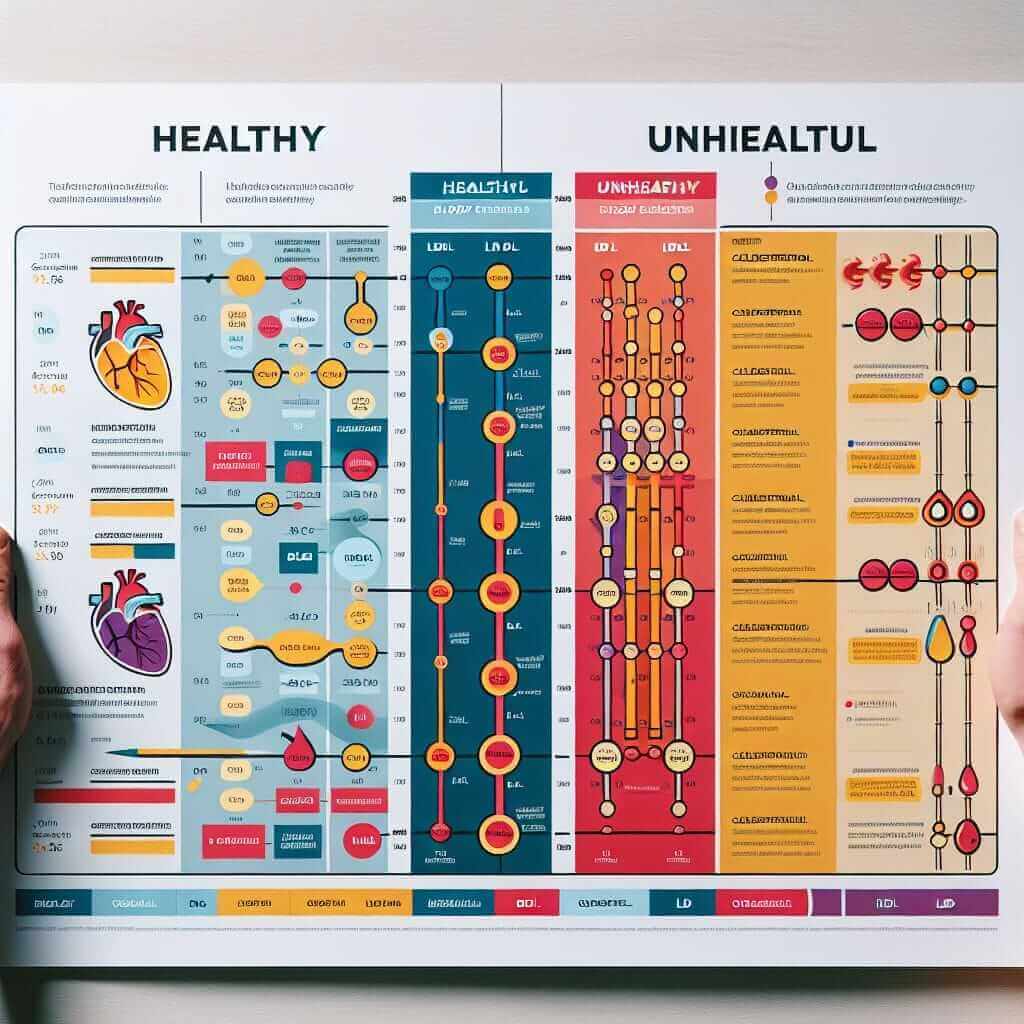“Cholesterol” is a waxy, fat-like substance found in the blood and all cells of the body. Maintaining healthy cholesterol levels is crucial for overall well-being, making it a relevant topic in the IELTS exam, particularly in the Listening and Reading sections related to health and lifestyle.
Here are some synonyms and antonyms for “cholesterol”:
| Word | Part of Speech | Definition | Example |
|---|---|---|---|
| Cholesterol | Noun | A fatty substance essential for cell function. | High cholesterol can increase the risk of heart disease. |
| Lipids | Noun | A group of naturally occurring molecules that include fats. | Cholesterol is a type of lipid. |
| Fats | Noun | A type of lipid that provides energy. | Eating too many saturated fats can raise cholesterol levels. |
| Lipoproteins | Noun | Proteins that carry cholesterol through the bloodstream. | There are two main types of lipoproteins: HDL and LDL. |
| Healthy | Adjective | Beneficial for overall well-being. | Maintaining healthy cholesterol levels is important. |
| Unhealthy | Adjective | Detrimental to health. | Unhealthy cholesterol levels can lead to various health problems. |
Delving Deeper into “Cholesterol”
What is Cholesterol?
Cholesterol is a crucial substance for our bodies, contributing to cell membrane formation and hormone production. However, high levels of cholesterol in the blood can lead to serious health issues, primarily cardiovascular diseases.
Pronunciation and Usage
The word “cholesterol” is pronounced /kəˈlɛstəˌrɒl/. It’s commonly used in discussions about health, diet, and lifestyle. For example:
- High cholesterol is a major risk factor for heart disease.
- Eating a balanced diet can help you maintain healthy cholesterol levels.
- Your doctor can check your cholesterol levels with a simple blood test.

“Cholesterol” in the IELTS Exam
“Cholesterol” frequently appears in the IELTS Listening and Reading sections, especially in passages related to:
- Health and Nutrition: You might encounter this term in texts about healthy diets, risk factors for diseases, or the benefits of exercise.
- Scientific Research: Research articles discussing the impact of cholesterol on cardiovascular health or new treatments for high cholesterol often use this term.
Sample IELTS Question (Listening)
Listen to the following recording about cholesterol and answer the questions below.
- What are the two types of cholesterol mentioned?
- What is the recommended level of good cholesterol?
Answer:
- The two types of cholesterol mentioned are HDL (good cholesterol) and LDL (bad cholesterol).
- The recommended level of good cholesterol (HDL) is above 60 mg/dL.
Sample IELTS Question (Reading)
Read the following passage and answer the questions below.
Cholesterol, a fatty substance vital for cell function, can pose serious health risks when found in excess in the bloodstream. High cholesterol levels can lead to the buildup of plaque in arteries, increasing the risk of heart disease and stroke. While our bodies naturally produce cholesterol, dietary intake plays a significant role in regulating its levels.
- What are the potential consequences of high cholesterol levels?
- What factors contribute to cholesterol levels in the body?
Answer:
- High cholesterol levels can lead to plaque buildup in arteries, raising the risk of heart disease and stroke.
- Cholesterol levels are influenced by both the body’s natural production and dietary intake.
Expanding Your Vocabulary: Collocations and Idioms
Using “cholesterol” effectively in your IELTS responses requires understanding its common collocations:
- High/low cholesterol: This refers to the level of cholesterol in the blood.
- Cholesterol-lowering drugs: These medications help reduce cholesterol levels.
- Dietary cholesterol: This type of cholesterol comes from the food we eat.
- Cholesterol test: This blood test measures the levels of cholesterol in your blood.
- Good/bad cholesterol: HDL is considered “good” cholesterol, while LDL is considered “bad” cholesterol.
Conclusion
Mastering the vocabulary related to “cholesterol” equips you to better comprehend and respond to IELTS questions concerning health and well-being. By incorporating these terms accurately and appropriately, you can demonstrate a strong command of English vocabulary and enhance your performance in the exam. Remember to practice using this vocabulary in various contexts and familiarize yourself with related terms to broaden your understanding.
For further information on maintaining healthy cholesterol levels, you can visit the Heart UK website. This website offers valuable insights into cholesterol management and heart health.